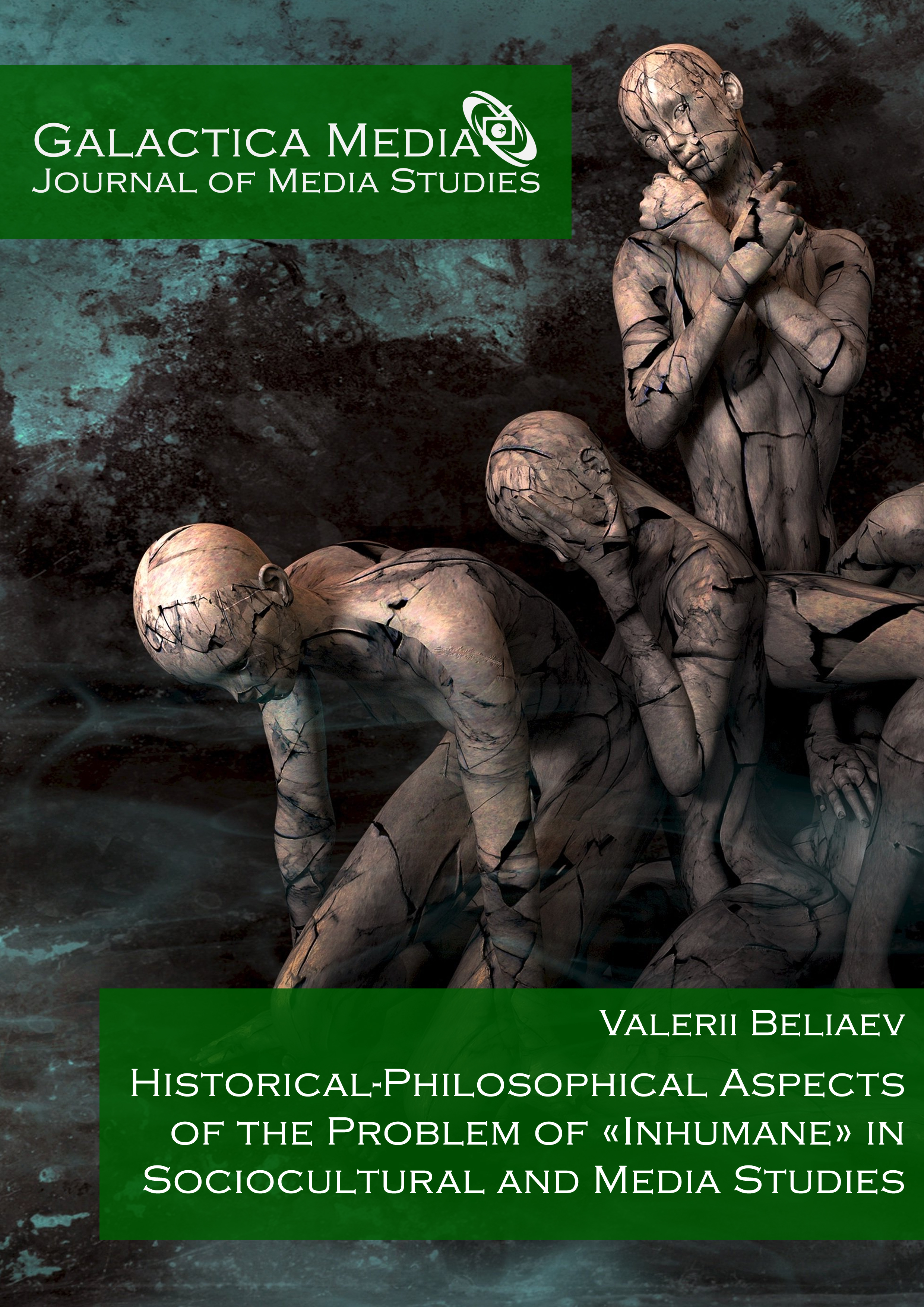Abstract
The idea of being «inhuman» is quite usual for the history of philosophy. With Aristotle, on the one hand, who first problematized the dialectics of the Slave and the Master, which later became an important part of Hegelianism and Marxism, as «dehumanization» and similar concepts of modern philosophy, on the other hand. For instance - the social constructivism. In Aristotle’s system, the role of the human himself belongs only to the Master, while the Slave is understood as a mere «tool» to him. In Physics, Aristotle also raises the question of the «inhuman» by introducing the notion of «Automaton», which denotes an occasion, which is the result of the act of something different from human, as opposed to the anthropic «Tyche». Similarly, the automaton is explained in the philosophy of Descartes. Despite the fact that the similar term «Cyborg», introduced by Donna Haraway, originated in a completely different philosophical tradition, the ontological foundations of all these concepts have a number of intersections, discussed in the following. Author tends to thematize the concept of «human» as an element of the production of knowledge and practices of power. Many social and media theorists, apart from Haraway, drew attention to the fact that the person himself as well as the surrounding practices, is a construct. First, we are talking about the communicative aspects of human existence could be influenced by discourse, which is also discussed in the report.
References
Adorno, T. & Horkheimer, M. (2002). Dialectic of Enlightenment. Stanford: SU Press.
Althusser, L. (1970). Ideology and Ideological State Apparatuses. Retrieved from https://www.marxists.org/reference/archive/althusser/1970/ideology.htm
Aristotle. (2009). Politics. A Treatise on Government. Retrieved from https://www.gutenberg.org/files/6762/6762-h/6762-h.htm
Aristotle. (2015). Physics. South Australia: University of Adelaide. Retrieved from https://ebooks.adelaide.edu.au/a/aristotle/physics/index.html
Battista C. & Sande M. (2019). Critical Theory and the Humanities in the Age of the Alt-Right. Cham: Palgrave Macmillan.
Baudrillard, J. (2007, 1 april). Forget Foucault. Anthropology.ru. Retrieved from http://anthropology.ru/ru/text/bodriyar-zh/zabyt-fuko (in Russian)
Baudrillard, J. (1988). Selected Writings. Stanford: Stanford University Press.
Baudrillard, J. (2017). Fatal strategies. Moscow: RIPOL.
Descartes, R. (1998). The World and Other Writings. Cambridge: Cambridge University Press.
Engels, F. (2010). Origin of the Family, Private Property, and the State. Retrieved from https://www.marxists.org/archive/marx/works/download/pdf/origin_family.pdf
Foucault, M. (1995). Discipline and Punish. The Birth of the Prison. New York: Vintage Books.
Foucault, M. (2003). The Birth of the Clinic. An Archaeology of Medical Perception. Abingdon, UK: Routledge.
Foucault, Michel. (2005). The Order of Things. An archaeology of the human sciences. London: Routledge.
Gramsci, A. (1999). Selections from the Prison Notebooks. London: ElecBook.
Haraway, D. (2016). Tentacular Thinking: Anthropocene, Capitalocene, Chthulucene. London: Duke University Press.
Haraway, D. (2017). A Cyborg Manifesto: Science, Technology, and Socialist-Feminism in the Late Twentieth Century. Moscow: Ad Marginem. (in Russian)
Klein, J. (2019, Sept. 26). How to Develop an Appetite for Insects. New York Times. Retrieved from https://www.nytimes.com/2019/09/26/science/eating-insects-entomophagy.html
La Mettrie, J. (2017). Man-Machine. Retrieved from http://www.earlymoderntexts.com/assets/pdfs/lamettrie1748.pdf
Land, N. (2018). Works V. 2. Cybergothic. Perm: HylePress. (in Russian)
Land, N. (2018, 20 november). Thirst for extermination (Introduction). Syg.ma. Retrieved from https://syg.ma/@sickrrett/nik-lend-zhazhda-istrieblieniia-priedisloviie-pierievod (in Russian)
Marcuse, H. (1964). One-Dimensional Man: Studies in the Ideology of Advanced Industrial Society. Boston: Beacon.
Marx, K. (2009). On the Jewish Question. Retrieved from https://www.marxists.org/archive/marx/works/1844/jewish-question/
Ranciere, J. (2010). Dissensus on politics and aesthetics. New York: Continuum. Retrieved from http://artsites.ucsc.edu/sdaniel/230/Ranciere%20-%20Dissensus%20-%20On%20Politics%20and%20Aesthetics.pdf
Subramanian, M. (2019, May 21). Anthropocene now: influential panel votes to recognize Earth’s new epoch. Nature. Retrieved from https://www.nature.com/articles/d41586-019-01641-5
Virno, P. (2013). A Grammar of the Multitude: For an Analysis of Contemporary Forms of Life. Moscow: Ad Marginem. (in Russian)

This work is licensed under a Creative Commons Attribution 4.0 International License.

